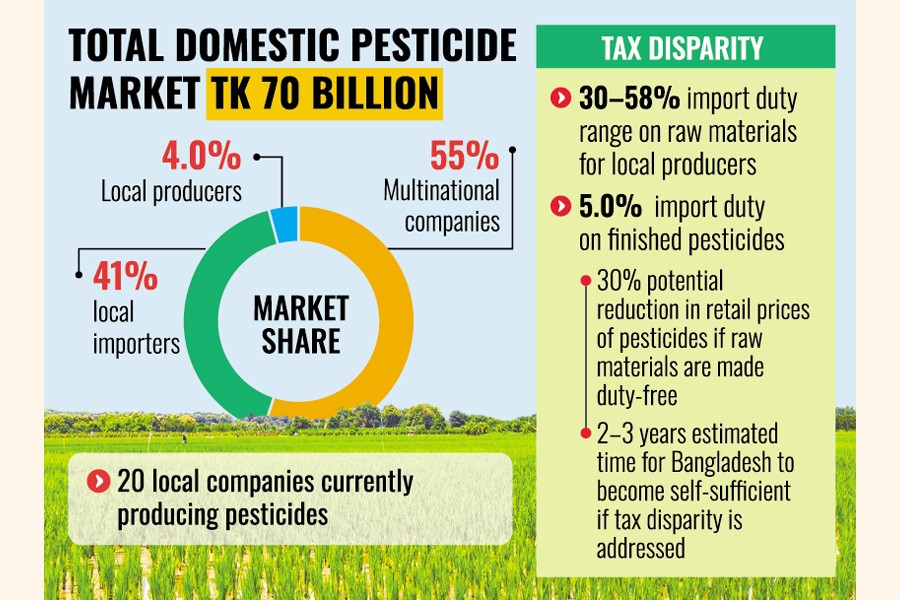
Published :
Updated :

Local manufacturers of pesticides are struggling to stay competitive as they face tax rates more than eleven times higher than those imposed on importers of finished products.
Industry leaders warn that the steep tariff gap is discouraging investment, idling factory capacity, and preventing Bangladesh from becoming self-sufficient in pesticide production.
They say that if raw material imports were made duty-free, local producers could cut retail prices by at least 30 per cent, lowering costs for farmers and boosting agricultural productivity.
Despite repeated appeals to policymakers, however, the disparity in tax treatment remains unresolved.
Industry sources said the tax rate on raw material imports for pesticide production ranges from 30 to 58 per cent, compared to just 5 per cent on imported finished pesticides.
Entrepreneurs who have invested in pesticide manufacturing say many plants are either running below capacity or remain idle, as local production is no longer commercially viable under the current tax regime.
Manufacturers said they have raised the issue repeatedly with policymakers, but no concrete steps have yet been taken.
Bangladesh Agrichemical Manufacturing Association (BAMA) President KSM Mostafizur Rahman said a meeting was held at the National Board of Revenue (NBR) on August 27, 2025 to rationalise import taxes and support local producers. "The meeting decided to place the issue before higher authorities for consideration," he said.
Local manufacturers currently pay import duties of up to 58 per cent on materials used in pesticide production.
The meeting was attended by representatives from the Ministry of Agriculture, the Department of Agricultural Extension, Bangladesh Sudan Ginning Industries Limited, the Bangladesh Crop Protection Association and BAMA, all of whom recommended tax relief to help farmers access pesticides at lower cost.
The session was chaired by NBR Member (Customs) Mohammad Mubinul Kabir. Despite several attempts, Mr Kabir and his first secretary could not be reached for comment.
"We are not sure why the NBR is not responding to the local manufacturers' call while continuing to favour importers with such a large duty gap," said Mr Rahman.
He added that aligning import duty rates for local producers and importers would comply with the World Trade Organisation's (WTO) Trade Facilitation (TF) rules.
In September 2025, Md Saiful Islam, Deputy Secretary at the Ministry of Commerce, confirmed in a letter plans to ease raw material imports and extend duty exemptions to encourage domestic production.
A meeting titled "Opening the Door to Local Pesticide Production and Export" was held at the Ministry of Commerce on September 29, chaired by the commerce secretary and attended by representatives from 11 ministries.
doulotakter11@gmail.com


 For all latest news, follow The Financial Express Google News channel.
For all latest news, follow The Financial Express Google News channel.